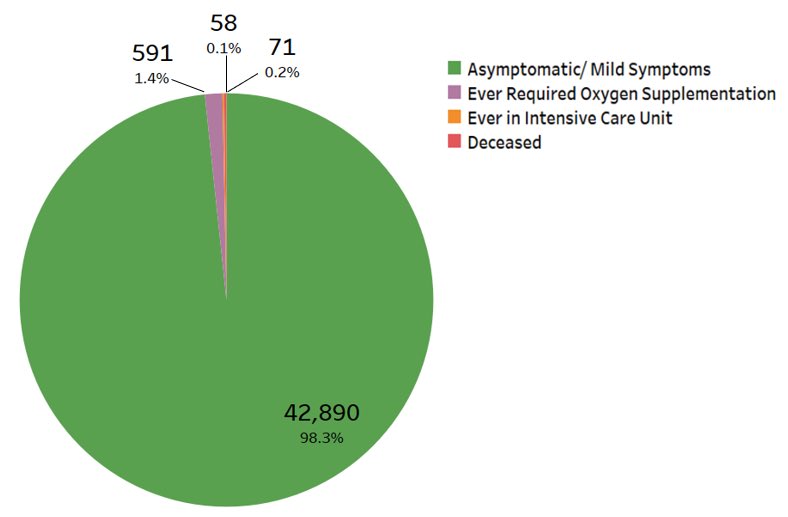“The vaccines don’t work- look at Singapore.” Alright, let’s do it.
Cases are at record highs due to Delta, however, OVER 98% of Singapore’s vaccinated cases are MILD or have NO symptoms. In addition, the nation has had VERY FEW deaths despite a surge in cases.
I’m not done.🧵
As of Tuesday, 83% of Singapore’s population is considered to be fully vaccinated. TO NOTE: Singapore recently transitioned away from a Zero COVID approach. The rise in cases upon attempting to reopen was to be expected as part of attempting to “live” with the virus and reopen.
According to their MOH, over the last 28 days, of the 43,610 infected individuals, 98.3% are MILD or have NO symptoms, 1.4% required oxygen supplementation, 0.1% required ICU care, and 0.2% had died. https://t.co/jY4IrZwP3l. https://t.co/RnUYw47i4g

Singapore reports vaccine effectiveness of 69% against ANY infection, 80-90% against symptomatic disease, 93% against severe COVID-19 that requires oxygen supplementation, ICU admission, and death. Most Singaporeans have received Pfizer’s and Moderna’s vaccines.
As of yesterday, 3 more cases had passed away from complications due to COVID-19 infection. According to the MOH, the individuals were aged between 68 and 102 years. All of them had been unvaccinated against COVID-19, and had various underlying medical conditions.
So why are they seeing these numbers? Let’s break this down. “Hospital beds are filling up because of the country’s “very cautious” approach, and NOT because that many people need acute medical care,” according to Teo Yik-Ying, dean of the Saw Swee Hock School of Public Health
at the National University of Singapore. “Case numbers may remain high for a few months, but the “vast majority” will be well protected by the vaccines and won’t fall seriously ill.” “The long-term plan against COVID is a combination of vaccination and natural infection to
provide protection while not overwhelming hospitals,” he said, adding that he does “not anticipate an increase in the death rate, but the absolute numbers can be expected to rise.” The majority of Singapore’s numbers therefore can be attributed to nervous residents with LITTLE or
NO symptoms overwhelming hospitals. “The resulting high numbers are causing a lot of anxiety and worry. People are flooding hospitals and GP clinics. This affects healthcare manpower as staff are quarantined and wards shut down.” A policy of mass testing asymptomatic people,
many of whom rush to hospital after a positive, even if free of symptoms are currently what is driving Singapore’s case numbers. “Instead of infection followed by vaccination, we’re going to go vaccination followed by infection, which I think is even better because [infections]
will mostly be mild,” said Ooi Eng Eong, a professor in Duke-NUS Medical School’s emerging infectious diseases program. Experts also say that Singapore's climbing cases, more than half of which are in vaccinated individuals, may signal that COVID-19 is becoming an endemic disease
in the city-state, meaning COVID-19 circulates in a population like its four coronaviruses cousins but doesn't upend lives due to widespread immunity. As long as deaths remain low, Singapore can set an example for how other countries, especially those that have maintained zero
tolerance for COVID-19, can emerge from the pandemic. Singapore's successful vaccination rate has kept severe cases AND deaths DOWN. You can read all of this and more here:
•https://t.co/rJjN8d1ec6
•https://t.co/asDgWQqeSX
•https://t.co/gVyMbkcjEZ
•https://t.co/jY4IrZwP3l
